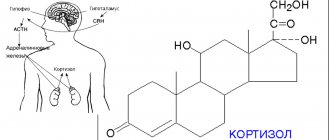Being a biologically active substance of steroid nature, the hormone cortisol is synthesized by the adrenal cortex and plays an important role in the body.
It is capable of influencing human health in a variety of ways; in a difficult situation of stress, it activates all protective forces, helping to survive, protecting the heart from stopping.
But the crazy rhythm of life so often puts the body under stress that it does not have time to balance the balance of splashed hormones, an excess of which causes illness. Cortisol - what it is and how it acts on the human body, you will learn in more detail.
Excess cortisol in the blood of people is one of the oldest reactions; many years ago, our ancestors found themselves in severe stressful situations every day, which resulted in stable releases of the hormone into the blood.
It promoted a rush of blood flow to the muscles, which was accompanied by a flow of blood from other vital systems. Blood flowing abundantly into the muscles, due to the excess content of the hormone, allows a person to run quickly or get into a fight with greater strength and endurance.
Nowadays, it is not necessary to defend your life and the right to exist through fights, and domestic conflicts are most often resolved through conversations, but the action of the hormone still continues its usual age-old work.
Cortisol - what is it and what is it responsible for?
Cortisol or hydrocortisone has several interpretations, some call it the death hormone, others call it the hormone of stress, and others even call it the hormone of excess fat.
Being a main participant in the development of stress processes, it regulates carbohydrate metabolism, promotes the production of red blood cells and platelets and the breakdown of fats, and affects thinking ability and concentration.
Its important function is to preserve energy resources in the body. It enters the liver with the bloodstream, easily penetrating into the cell nuclei due to its lipophilic nature and sticks to receptors, forming a hormone-receptor complex.
This complex activates certain sections of DNA in hepatocyte cells of the liver, without which important processes of protein synthesis and storage, carbohydrate conversion and other processes cannot occur.
Cortisol, as part of the complex, enhances the synthesis of glucose in hepatocytes and it is stored there in the form of glycogen. And glucose, as you know, is an important source of energy.
In addition, it is considered a substance with a strong anti-inflammatory effect and is used in medicine to treat bronchial asthma, rheumatoid arthritis and allergies.
The hormone is synthesized in response to external stimuli, therefore it is often called the stress hormone. Performs important work at the moment of strong overexcitation of a person, supports the functioning of the nervous system and prevents the heart from stopping.
Why is it important for women
Women are more emotional than men and get upset even over trifles, exposing their body to stress. Therefore, the cortisol level is an important indicator. For women, this is 140 - 600 nmol/l; if the figure is higher, this indicates an increased level of anxiety. A decrease in level can cause disruptions in the functioning of the endocrine and nervous systems.
Disturbances in the sexual and menstrual cycles occur; disturbances in the functioning of the ovaries can lead to infertility.
woman's body's response to stress
Sometimes the cause of disorders is a passion for diets that provoke hormonal imbalance. The absence of both fats and carbohydrates in food is stressful for the body and leads to an increase in the synthesis of the hormone, which provokes the deposition of fat on the hips and abdomen.
What role does it play for men?
In men, a blood test evaluates the hormone not only bound to protein, but also free. Along with the function of increasing blood pressure, the hormone activates the process of fat breakdown, carbohydrate metabolism, and blood sugar levels.
Among athletes seeking to build muscle mass, the substance is known as a hormone disruptor. High cortisol provokes increased blood pressure, a feeling of fatigue, and a slowdown in metabolism, which causes another stress that becomes chronic.
Increased levels of the hormone provoke a decrease in protein synthesis. With increasing physical activity, when there is a large consumption of glucose and a decrease in its composition in the blood, cortisol does not contribute to the growth of muscle mass, but to the breakdown of muscle fibers.
For men, the hormone norm is approximately the same as for women. The hormone values have a wide range, which changes (in addition to external stimuli), depending on the time of day, rising to 720 in the morning, and decreasing to 70 nmol/l in the evening. Indicators change with age; in older people, the upper limit decreases.
How to reduce the hormone cortisol
To normalize the hormone cortisol, you need to:
- Limit or stop drinking coffee, soda, and energy drinks. These foods trigger an increase in cortisol levels.
- Reduce intake of processed foods as they raise blood sugar levels and make a person feel anxious.
- Stop eating white bread, pasta, rice, chocolates, lollipops, and flour.
- Maintain water balance, drink at least 2 liters of water per day. Even dehydration by 0.5 liters increases the concentration of cortisol.
- If the urea is too dark, it is a sign that the body is not getting enough water. At normal water levels, urine will be almost the same color as water.
- Take fish oil. It can be in the form of fat, in tablet form, or directly in the fish. The most suitable fish are salmon, mackerel and sardine.
- Try to abstract yourself from nervous situations and stress.
How it affects the body
At the slightest stress or irritability, the human brain receives impulses, as a result of which the adrenal glands receive a signal to urgently produce cortisol. After a couple of seconds, the functioning of the body’s immune system begins to sharply decline, all cognitive functions are inhibited and digestion processes are disrupted.
At this time, proteins and carbohydrates rapidly begin to break down in our body, activating the work of muscle mass through this process.
These processes in the body completely explain the body’s weakness and instability to diseases and colds during stress.
Excess cortisol leads to drowsiness, impaired activity, loss of appetite, and loss of correct perception of information. Hormone levels return to normal after the brain receives information about eliminating the stimulus.
The table shows what normal hormone levels should be:
Normal content in the body
The normal level of cortisol in the blood is a very broad concept. The largest difference in hormone values in children from one year to 10 years is 28-1049 nmol/l. At 10-14 years old, normal levels are already 55-690 nmol/l. Cortisol in children 14-16 years old is considered normal in the range from 28 to 856 nmol/l.
In adults over 16 years of age, the normal level of total hydrocortisol in the blood is 138-635 nmol/l. The level of free cortisol in urine is often measured; here the normal value is 28.5-213.7 mcg/day.
Obstetricians-gynecologists often have to answer the question: cortisol - what is it in women during pregnancy. During pregnancy, the level of stress hormone increases 2-5 times, and this is the absolute norm. There are two reasons here, the first is the participation of cortisol in the development of the baby’s respiratory system. The second reason is the hormone’s reaction to a natural stressful situation, that is, pregnancy.
What does an elevated level of cortisol in the blood indicate?
A consistently high level of the hormone may be an indicator of the occurrence of tumors in the human brain, namely basophilic pituitary adenoma.
When the disease occurs, an increased level of adrenocorticotropic hormone (ACTH) begins to be produced, which activates the already excessive secretion of a harmful substance. If you do not pay attention to the data, then very soon a disease called Itsenko-Cushing syndrome (hypercortisolism) may appear.
The syndrome is accompanied by severe obesity, puffiness of the face, taking on a “moon-shaped” shape, and slight redness of the cheeks. External changes include excess fat in the abdomen, neck and chest, but during this disease the legs always remain too thin compared to the puffy body.
Favorable ground for the flourishing of Itsenko-Cushing syndrome can be a disease of the adrenal glands, namely an adenoma, nodular hyperplasia, or adrenal cancer itself. In such cases, the pituitary gland no longer affects excess cortisol. You should not miss out on diseases such as liver cirrhosis, thyroid pathologies, hypothyroidism and hyperthyroidism.
Elevated cortisol often indicates all of the above diseases, however, in the early stages, an excess of this hormone can manifest itself in more lenient forms.
What this can lead to:
Sudden loss of muscle mass. For normal energy production, the human body begins to use carbohydrates and fats, and later muscle tissue. The processes in the body go astray and the muscles become the first supplier of energy, their mass begins to drop sharply.
The appearance of excess weight. The stress hormone sends signals to the brain that the body does not have enough food, and it activates a person’s feeling of hunger. When cortisol is elevated, you want to eat something sweet or high in calories; it is sugar that begins to protect the body, reducing the level of harm it causes. This results in overeating and the appearance of fat deposits.
Excess fat deposits in the abdominal area. Excessive amounts of cortisol contribute to the appearance of deposits in the abdominal area, fat is also deposited under the muscles, pushing the stomach forward and giving the figure a rounded shape.
Development and sharp progression of diabetes mellitus. Hydrocortisone increases the sugar level by 2 times: initially, it contributes to a sharp decrease in insulin secretion, and then it starts the process of muscle breakdown into glucose. A consistently high hormone in humans is recognized as the culprit in the development of type 2 diabetes.
A sharp drop in testosterone levels. The hormone cortisol is considered the exact opposite of the main male hormone testosterone. They cannot act and actively work together, which leads to an increase in the level of the first or second. Excess hydrocortisone suppresses testosterone, sharply reducing its levels.
Loss of strength and weakened immune system. Initially, when excess occurs, the hormone exhibits an anti-inflammatory effect, causing the immune system to become inactive.
It begins to weaken, opening the way for viruses, colds and other diseases that depress it even more.
Progression of cardiovascular diseases. Due to the strong weakening of the immune system through the action of cortisol, the human body, when faced with stressful situations, works to its limits. Such loads double or even triple the risk of stroke or heart attack.
The appearance of osteoporosis. High levels of hydrocortisol in the blood disrupt the body's absorption of calcium and collagen, which becomes a direct source of bone destruction and the process of their regeneration.
The main causes of elevated cortisol in the blood
To know how to avoid the consequences of increasing the hormone cortisol in the blood, you should take into account all the possible causes of their occurrence. There are a lot of them, but scientists identify four main culprits of excess “stress hormones”.
- Not eating enough or going hungry. An increase in hormone levels occurs in people who refuse certain foods, while cutting back on glucose intake.
- Stable stress state. Increased nervous excitability of a person is a positive basis for increasing the level of the hormone. Constant nervous breakdowns, stress and stress force the body to draw energy from all available sources, which increases the level of cortisol and completely depletes the body itself.
- Strong physical activity. A person, loading his body by working out in the gym or performing difficult physical work, pushes the body to stress. Depending on the load, the self-healing process is activated. But when the load is too long and active, the level of cortisol increases sharply and does not have time to fall.
- Caffeine consumption. One cup of morning coffee can increase the level of the hormone in the blood by at least 30 percent, and the hormone will begin to decrease only after a couple of hours. Excessive consumption of drinks containing caffeine, stressful conditions, and active physical activity maximize its level, preventing it from dropping.
Symptoms of elevated cortisol in the blood
If you lead an active lifestyle, are often exposed to physical activity, like to drink coffee in the morning or during your lunch break at work, you should know the symptoms of increased stress hormone in the blood, which can be a harbinger of serious diseases associated with its excess.
If an increase in body fat mass occurs with stable sports and physical activity, while maintaining a healthy diet and lifestyle, and muscle mass, on the contrary, rapidly decreases, then you should urgently check your blood for an excess of the hormone cortisol in the blood.
Increased heart rate. When the hormone content in the blood increases, a sharp narrowing of the arteries occurs, leading to an increased heart rate. If, when measuring your pulse in a calm state, you see that it is rapid, this symptom may indicate an excess of the hormone.
Irritability. Excessive synthesis of hydrocortisol creates favorable conditions for a negative and sharp reaction to external stimuli and situations, creating a stressful state.
Problems with potency. Cortisol completely destroys the main male hormone - testosterone, which causes problems in men, since low testosterone levels lead to a sharp decline in libido and decreased potency.
Disruption of the digestive system. An active increase in the substance in the human blood gradually destroys the body’s digestive processes, which are subsequently accompanied by poor absorption of food, a bloated abdomen, diarrhea and colitis.
Increased sweating and frequent trips to the toilet. Heavy sweating and frequent urination are constant symptoms of increased cortisol, which have a detrimental effect on the body. With sweat, a person loses important salts and minerals, without which the healthy existence of the body is impossible.
Chronic depression and insomnia. Depression is not only a consequence of excess cortisol, but also its initial symptom. Poor sleep also puts the body under severe stress, which allows excess hormones to develop in the blood.
Elevated levels of the hormone can be both a harbinger of a serious illness and a cause of heavy physical activity or constant stress.
How to reduce hormone levels
If the hormone level is elevated, consultation with a doctor is required; only professional treatment and advice will help normalize the situation. But there are also generally accepted points that help normalize your health. Pay attention to:
- balanced diet, excluding fast carbohydrates, alcohol and coffee and adding slow carbohydrates and fats to your diet;
- duration of physical activity;
- obtaining positive emotions (watching comedies, reading light books, walking with pleasant people, excursions) and eliminating stressful situations;
- a full night's rest, with at least 8 hours of sleep;
- taking amino acids and vitamins, biological supplements to reduce high hormone levels.
How to reduce the hormone cortisol?
An increase or decrease in cortisol is always dangerous for health. Any deviation from the norm indicates a malfunction of the body.
How to bring the hormone cortisol back to normal without resorting to medications? In fact, treatment should be comprehensive. But first of all, you should start with the following points:
Physical activity
The more you are outdoors, the lower your levels of the hormone cortisol, or the “fear hormone.” The body is saturated with oxygen, as a result, feelings of anxiety and stress are reduced, and thought processes are improved. To make your outings into nature frequent and constant, get yourself a dog. With it you will be much more active.
Normalization of nutrition
Cortisol levels can also vary depending on the quality of food we eat. Thus, it has been scientifically proven that foods rich in vitamins C (citrus fruits, honey, nuts) and B vitamins (protein foods) significantly reduce susceptibility to stress and depression.
At high levels, as well as at low cortisol levels, fast food, carbonated drinks, alcohol, and smoking should be avoided. Such changes in your diet will affect your entire body in the most positive way.
Another important recommendation is that fasting is strictly discouraged.
Full sleep
The body needs healthy sleep and proper rest. Remember that fatigue, apathy, anxiety and irritability do not appear out of nowhere; they are provoked by a lack of rest. Sleep is of enormous importance. For health and normal levels of cortisol in the blood, you should sleep at least 8 hours. The best time to recuperate is from 21.00 to 02.00.
New impressions
Tired of monotonous work? Have you tried changing it? We are talking about those situations when you go to work literally “under pressure.” Perhaps you should look for something that will captivate you and give you positive emotions?
Remember that you only live once, so is there any point in wasting time on things you don’t like?
How you spend your leisure time is also very important. So, on the weekend, even if the work week was extremely difficult, find the strength to go somewhere - to the cinema, theater, visit friends, visit new places. The main thing is not to lock yourself within the four walls of your home.
How to reduce cortisol with drugs?
Of course, if you can’t improve your health on your own, then the best way to bring cortisol back to normal is to use medications. However, remember that they are prescribed exclusively by a doctor. So, the most effective drugs:
- Omega 3 (fish oil).
- Magnerot – replenishes magnesium deficiency and reduces cortisol production.
- Novopassit.
- Aflubin.
- Glycine Forte Evalar.
- Magnesium B6 (a cheaper analogue is Magnelis B6).
These drugs have a sedative effect - they increase resistance to stress and increase vitality.
How to reduce cortisol with folk remedies?
There are several medicinal herbs that will help get rid of nervous tension and bring the cortisol hormone back to normal.
Siberian ginseng
Another name for the herb is Rhodiola rosea or golden root. These herbs are excellent antidepressants, allowing a person to relieve anxiety, improve mood, and stabilize the emotional background. In addition, they help get out of depression. “Nerves of iron” are guaranteed to you.
St. John's wort
St. John's wort is a unique herb whose healing properties have been scientifically proven. St. John's wort is a powerful antidepressant and can also improve immunity. You can drink this herb before important and exciting events, then fear will leave you and everything will go like clockwork.
Liquorice root
Licorice root primarily normalizes the functioning of the adrenal glands. Helps not only with high but also low cortisol.
Licorice has a general positive effect on the human hormonal system, especially the male one - it normalizes androgen levels.
It is not advisable to drink licorice root for a long time. A course of 4-5 weeks is enough, then you should take a break.
Ginko Biloba
It is a powerful antioxidant. Available in both tablet form and herbal form for brewing. This plant improves brain function, stimulates mental activity, strengthens blood vessels, and slows down cell aging. Six-month use of this herb gives lasting results.
In conclusion, we want to say that now you understand what the hormone cortisol is and what it is responsible for. Its functions in the body are quite wide. To maintain it in normal condition, avoid stress. As you know, all diseases are caused by nerves. Play sports, change a job you don't like, get more rest and eat right - and then you will live happily ever after.
Journalists have dubbed cortisol the “stress hormone,” bodybuilders consider it enemy number one, those with huge waists blame it for the accumulation of visceral fat, and those suffering from insomnia shift responsibility for nightly lack of sleep onto it.
Let's figure out why cortisol has gained notoriety, why deviations of the hormone from the norm are dangerous, and what to do to prevent them.
Consequences of low cortisol in the blood
Too low a hormone level also does not bring positive results. The main indicators of a reduced level are:
- hypopituitarism, or too small a percentage of pituitary hormones;
- Addison's disease, or a sharp weakening of the adrenal glands;
- chronic cirrhosis or hepatitis of the liver;
- congenital insufficiency of the adrenal cortex;
- hypothyroidism;
- adrenogenital syndrome, or too much production of male sex hormones - androgens;
- abundant growth of facial hair in both men and women;
- sharp deepening of the voice.
Decoding the test for the hormone cortisol
The concentration of the hormone in the blood changes throughout the day, so the test should be carried out early in the morning on an empty stomach. Before the procedure, you should avoid physical activity and exercise, and do not be nervous. You should not drink alcohol the day before the test. Blood is taken from a vein and then examined in a laboratory.
Women are often interested in the question: when and on what day of the cycle should they take a cortisol test? The best option would be to take the test on days 3-7 of the cycle, but your doctor may prescribe it for the follicular or luteal phase. In the first case, blood must be taken from the first day of the cycle until ovulation occurs. The second phase begins after ovulation and lasts until the final day of the cycle. The gynecologist or endocrinologist will determine what day you should have the tests. The male half of the population can donate blood on an empty stomach any day.
If the hormone cortisol is elevated, it means that the adrenal glands are working at a faster pace than necessary. This disease is called hypercortisolism. The rise in cortisol levels in the blood is also affected by excessive production of this hormone by the body or its supply from the outside - taking hormonal medications.
If the hormone is elevated, then you should be examined for the presence of these diseases:
- blood glucose levels are too low (hypoglycemia);
- hypothyroidism – low levels of thyroid hormones;
- polycystic ovary syndrome;
- too much weight;
- adrenal hyperplasia;
- cirrhosis of the liver;
- drinking alcohol;
- hepatitis;
- dystrophy and anorexia.
Indirect reasons responsible for the increase in the hormone cortisol include:
- liver diseases;
- excessive weight;
- polycystic disease;
- pregnancy.
What are corticosteroids
If the human body does not produce enough cortisol, a doctor will prescribe corticosteroids. Corticosteroids are synthetic versions of cortisol that can be used to treat a variety of conditions, including:
- inflammatory conditions (such as asthma);
- Addison's disease;
- skin problems (for example, psoriasis).
- Side effects of corticosteroid therapy
- Because corticosteroids are powerful medications, side effects are quite common. These include:
- thinning of the skin;
- osteoporosis;
- weight gain;
- diabetes;
- high blood pressure.
If a patient experiences these side effects, a doctor should be consulted before stopping the medication.










